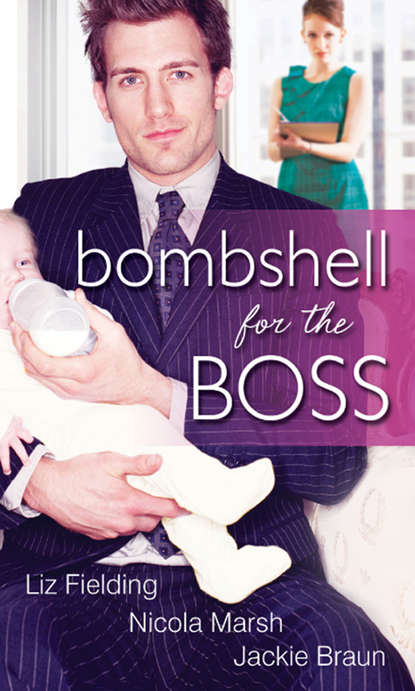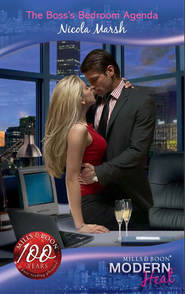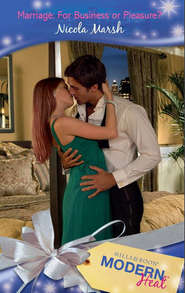По всем вопросам обращайтесь на: info@litportal.ru
(©) 2003-2024.
✖
Bombshell For The Boss: The Bride's Baby
Автор
Год написания книги
2019
Настройки чтения
Размер шрифта
Высота строк
Поля
‘From the clutter upstairs, I’d say that’s probably a good thing,’ he said, making no comment. Then, as if he didn’t have another thing in the world to occupy him, ‘Do you want to take a look up there now?’
‘It is a bit urgent,’ she said and glanced, a touch helplessly, at Pam’s desk. ‘Will Pam be back soon?’
‘Not in time to be of any help to you.’ For a moment he waited, his intention to make her ask for his help, to need him just once, but his curiosity got the better of him and, more interested in her urgent desire to examine the contents of an old trunk than in scoring points, he stood back and, inviting her to lead the way, said, ‘Shall we go?’
Neither of them moved, both remembering the last time he’d said those words.
Then, abruptly, Sylvie said, ‘There’s really no need to bother yourself.’ Which did nothing to allay his curiosity. ‘Honestly. I know the way.’
‘I’m sure you do, Sylvie, but it’s no bother,’ he assured her. ‘I’m going to have to clear the attics very shortly and it will be useful to have someone who can tell me what, exactly, is up there before it gets tossed into a skip.’
‘You wouldn’t!’ she declared, her eyes widening in a flash of anger. So Miss Sylvie Duchamp Smith wasn’t quite as detached about her family’s belongings—even the ones left to rot in the attics—as she would have him believe.
‘I might,’ he said carelessly. ‘One family’s treasures are another man’s junk.’
‘No doubt,’ she said, that quick flash of fire back under control.
‘Unless you can prove me wrong.’
‘It’s your junk. You must do with it as you wish.’
‘True.’ But having her acknowledge that fact gave him rather less pleasure than he’d anticipated which was, perhaps, why he said, ‘I should warn you that it’s pretty dusty up there so you might want to change your shoes. It would be a pity to spoil them.’
‘What?’ She looked down, let slip a word that somehow didn’t sound quite as shocking when spoken in those crisp consonants, perfectly rounded vowels.
‘Is there a problem?’ he enquired.
‘Yes!’ Then she wiggled her toes and, with an unexpected smile that turned the silvery-blue to the colour of a summer sky, she looked up and added, ‘And, then again, no. It just means that, having worn them most of the morning, I’m going to have to buy them.’
‘Is that a problem?’ he asked, recalling Pam’s earlier comments on the subject. ‘I understood shoe-buying was the antidote to all feminine ills.’
‘You shouldn’t believe everything that Candy told you,’ she snapped. ‘And I’m not here for recreational shopping.’
‘No?’ Obviously wedding planning was her livelihood but, even so, he’d have thought she’d have been a little less matter-of-fact about it. ‘I thought that was what weddings were invented for.’
‘If you believe that, Tom, I suggest you familiarise yourself with the words of the marriage service,’ Sylvie said, regarding him with a long cool look that made him wish he’d kept his mouth shut. Then, with an unexpected blush, she shook her head and said, ‘The truth is that this wedding is more about recreational borrowing. But once you’ve worn the shoes, they’re yours.’
‘You’ll never regret it,’ he said, finding it easier to look at her feet than her face.
‘I will if I don’t change them. Why don’t you go on and I’ll catch you up?’ she suggested, losing the tigerish protectiveness she’d shown when she’d thought he was prepared to throw the contents of all those trunks away. That touch of hauteur when she’d chastised him for his lack of respect for the marriage service. Instead, snapping back into a defensive attitude as she turned and walked quickly away, not waiting for him to answer her.
He did anyway, murmuring, ‘No hurry,’ as, for the second time that morning, he watched her retreat as fast as her pretty purple shoes would carry her. ‘I might get lost.’
Too late. He already was.
CHAPTER SEVEN
SYLVIE took a few moments to splash water on her face. Regain her composure.
She shouldn’t have asked him. She’d promised, but she had to be sure. She didn’t want to believe him so incapable of feeling …
She blew her nose, tucked a wayward strand of hair back into her scarf. Regarded her reflection in the glass. ‘Serves you right, my girl,’ she said, then laid her hand against her waist. ‘Be thankful for what you’ve got.’
And with that she changed into sensible shoes and rejoined Tom McFarlane at the foot of the stairs. Neither of them spoke but she was intensely conscious of him at her side, then at her back as she led the way up the last flight of narrow stairs to the attics.
Why on earth had he waited?
It wasn’t as if he didn’t know the way …
She reached for the light switch but he was a fraction faster and, as their hands connected, her mind was filled with the image of long fingers holding his pen, ticking off invoice after invoice, on that endless afternoon. The memory of their strength as he’d lifted her down from the van, the way they’d felt against her skin.
Demanding, tormenting, sensitive …
‘I’ve got it,’ he said pointedly and she yanked her hand back as if stung.
The tension between them was drawn so tight that she half expected the bulb to blow as he switched it on, but only the dust burned as, throwing a dim glow over the abandoned detritus of generations of Duchamp lives, it began to heat up.
‘Good grief!’ she said, more as a distraction than a genuine exclamation of surprise as she glanced around. ‘What a mess!’
‘I thought that was the general rule with attics? That they were a dumping ground?’
Вы ознакомились с фрагментом книги.
Приобретайте полный текст книги у нашего партнера:
Приобретайте полный текст книги у нашего партнера:











